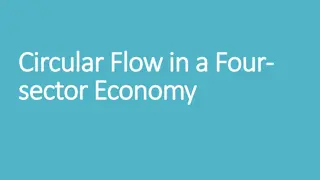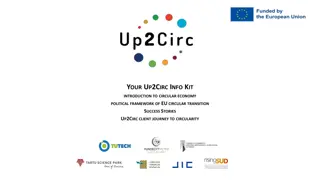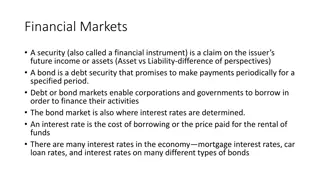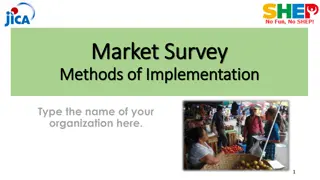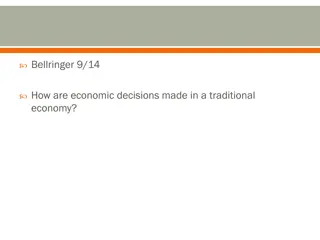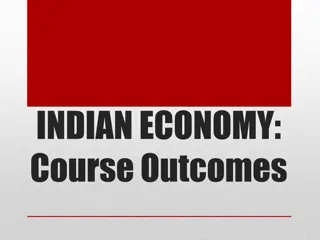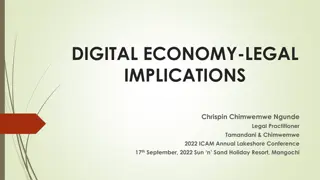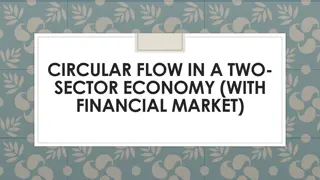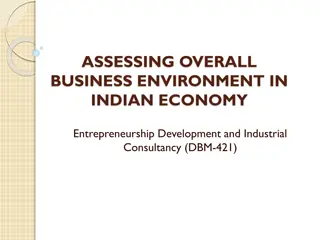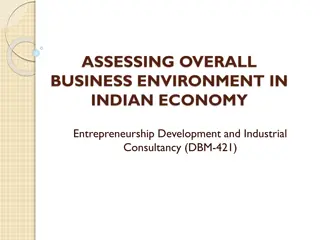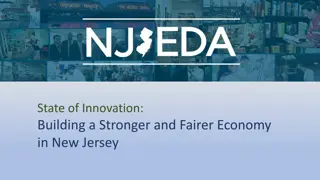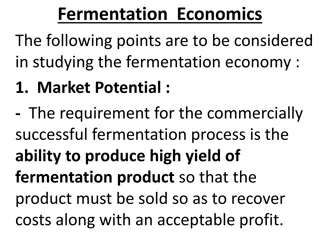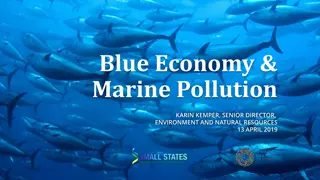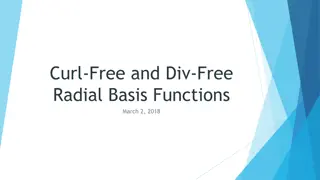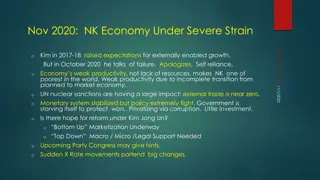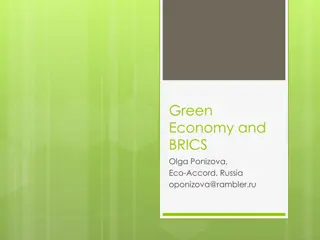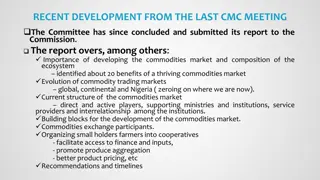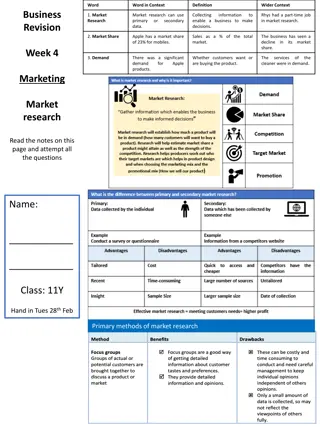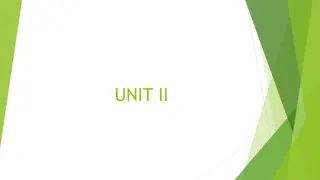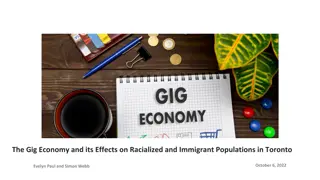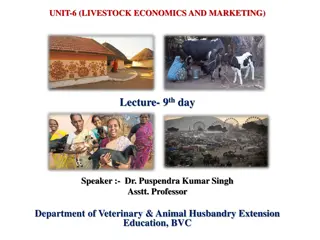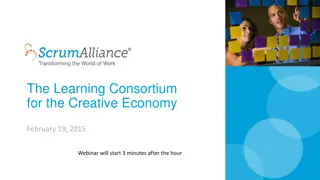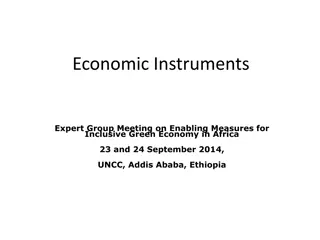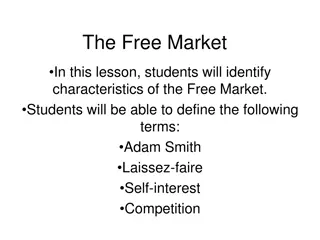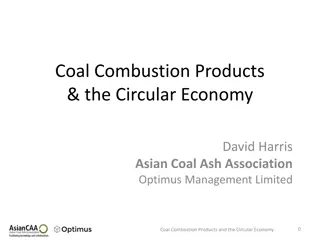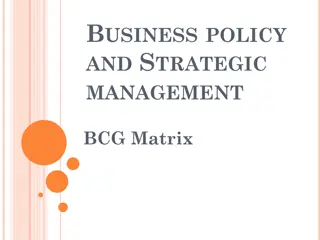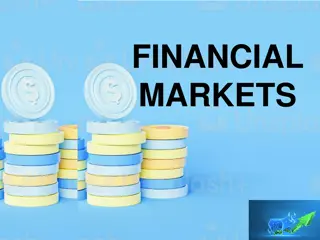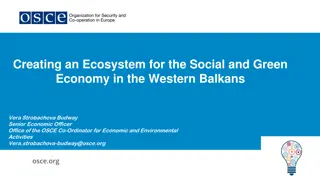Sustainability and the Blue Economy Concepts
The intertwining concepts of sustainability and the blue economy, focusing on historical developments, environmental protection events, and the emergence of sustainability science. Discover the pillars supporting a sustainable blue economy and pathways for inclusive development.
15 views • 40 slides
Circular Flow in a Four-Sector Economy Explained
The circular flow in a four-sector economy involves households, firms, government, and the foreign sector. Each sector plays a crucial role in money flows and payments, contributing to the continuous flow of income. The financial market also has a significant impact on the economy by accumulating sa
3 views • 8 slides
Glossary of Key Terms
Explore essential terms in economics such as command economy, consumer, demand, economic system, free enterprise system, goods, innovation, market economy, marketplace, mixed economy, needs, producer, profit, resources, scarcity, services, supply, technology, trade-off, traditional economy, and want
3 views • 6 slides
Accelerating Towards a Circular Economy Future
The circular economy presents a vital solution to tackle climate change by focusing on regenerative growth, reducing resource consumption footprint, and enhancing material use efficiency. The EU's Circular Economy Action Plan aims to usher in a sustainable future through decoupling economic growth f
2 views • 19 slides
Leveraging Non-Oil Exports for Nigeria's Blue Economy Growth
Nigeria Export Promotion Council (NEPC) focuses on diversifying Nigeria's economy by promoting non-oil exports for sustainable growth. The Blue Economy concept involves sustainable use of ocean resources for economic development. Nigeria's abundant ocean resources such as maritime transportation, fi
0 views • 20 slides
Overview of Financial Markets and Their Impact on the Economy
Financial markets encompass various segments like the bond market, stock market, and foreign exchange market, each playing a vital role in the economy. Bond markets facilitate borrowing for corporations and governments, while interest rates influence investments and savings. The stock market allows
0 views • 21 slides
Empowering Farmers Through Market Surveys
The market survey methodology outlined in the content focuses on empowering farmers by increasing their understanding of market dynamics, building relationships with market players, and enhancing decision-making skills. It involves structured steps like sensitization workshops, crop selection, and i
1 views • 23 slides
Economic Systems in the United Kingdom, Germany, and Russia
Economic decisions in traditional economies are based on customs and beliefs. The United Kingdom has a mixed market economy with a focus on service industries, while Germany's economy is export-based. Russia's economy leans towards a command system. By comparing these economic systems, one can see h
0 views • 11 slides
Overview of Vietnam Energy Sector Reform and Market Development
Vietnam's power sector reform and market development have been key drivers in transitioning from a central planning economy to an open-market economy. This reform aims to adapt to global economic changes, enhance competitiveness, and ensure sustainable growth in the rapidly evolving energy landscape
0 views • 20 slides
Understanding Indian Economy: Course Outcomes and Resources
Explore the course outcomes of the Indian Economy, covering economic development, policies, population growth, planning, agriculture, Kerala's economy, and resources for further study. Access government data and publications on the Indian economy for comprehensive learning.
0 views • 9 slides
Advancing Circular Economy Through Flexible Packaging Initiative
Flexible Packaging Initiative is driving a circular economy in Europe by emphasizing the importance of flexible packaging, showcasing key benefits, and outlining steps to ensure circularity in the recycling value chain. The initiative supports harmonized sorting labels, eco-modulated fees, and the p
5 views • 5 slides
Legal Implications of the Digital Economy in Malawi
Explore the legal implications of the digital economy in Malawi as discussed at the ICAM Annual Lakeshore Conference. Topics include the Electronic Transactions and Cyber Security Act, principles of implementation, Malawi CERT, data privacy, and the significance of the digital economy in transformin
0 views • 44 slides
Understanding Circular Flow in a Two-Sector Economy with Financial Market
In a two-sector economy with a financial market, households and firms engage in savings, investments, and borrowing through the financial market, unlike the simple circular flow assumption where no savings are made. This interaction between households, firms, and the financial market plays a crucial
0 views • 4 slides
Overview of Modern Business Environment in Indian Economy
Modern business in the Indian economy is characterized by large size, oligopolistic nature, diversification, global presence, technology orientation, and changing government regulations. The Indian economy features a mixed economy with both private and public enterprises, low per capita income, uneq
0 views • 14 slides
Overview of Business Environment and Economy in India
Business environment in India encompasses a mix of large, oligopolistic, diversified, and technologically oriented enterprises. The Indian economy is characterized by a mixed economy, low per capita income, and limited entrepreneurial potential. External and internal factors influence business opera
0 views • 14 slides
Insights into India's Thriving Gig Economy and Future Work Trends
India's gig economy, spearheaded by initiatives like IWWAGE, is reshaping the future of work, particularly for women. Key questions revolve around the gig economy's impact, legislative frameworks, and COVID-19 repercussions. Academia investigates the rise of gig work, focusing on platforms like Uber
0 views • 11 slides
Transforming New Jersey's Economy for Growth and Equality
New Jersey aims to revitalize its economy by focusing on key goals for 2025, including driving job growth, increasing wages, fostering diversity in STEM fields, erasing gender and racial wage gaps, and reducing poverty in urban centers. The plan involves investing in people, communities, innovation,
3 views • 5 slides
Understanding Fermentation Economics: Key Market Considerations
Studying the fermentation economy involves assessing market potential, competition, cost recovery, and distribution strategies. Market demand, competition, production costs, and potential profits are crucial factors to consider for successful commercial fermentation processes. Foreign sales can offe
0 views • 19 slides
The Blue Economy and Marine Pollution: A Comprehensive Overview
The presentation outlines the thriving ocean economy, the concept of the Blue Economy, the World Bank's approach, risks faced by oceans, and the impact of marine pollution on Small Island Developing States and coastal regions. It emphasizes sustainable development of oceanic activities, collaboratio
1 views • 12 slides
Understanding Curl-Free and Div-Free Radial Basis Functions in Physical Situations
This content explores the applications of Curl-Free and Div-Free Radial Basis Functions in solving partial differential equations for fields, the theoretical soundness of using RBFs, and examples illustrating divergence-free interpolation. It also delves into matrix-valued RBF formulations, converge
3 views • 13 slides
Understanding Market Sharing Cartels in Oligopolistic Markets
Perfect collusion in oligopolistic markets often involves market-sharing cartels, where member firms agree to share the market while allowing some degree of freedom in their decisions. This can be done through non-price competition or quota agreements. Non-price competition cartels involve setting a
8 views • 8 slides
Understanding Capital Market and Its Significance
Capital market refers to the market for long-term finance where financial assets like Shares, Debentures, and Bonds are traded. It plays a vital role in mobilizing funds for companies and governments, facilitating capital formation, and promoting economic growth. The classification includes Industri
0 views • 11 slides
Challenges and Transitions in North Korea's Economy
North Korea's economy faces severe strain due to weak productivity and external sanctions. Transitioning from a planned to a market economy has been incomplete, leading to low investment and corruption. The upcoming Party Congress may offer clues on reform under Kim Jong Un. Marketization, trade par
0 views • 15 slides
Insights into Social Economy and Social Dialogue Research Outcomes
Research outcomes from the Mesmer+ project at HIVA KU Leuven reveal misalignments in social dialogue inclusiveness, challenges faced by social economy entities, and the role of employers in the social economy. Recommendations include enhancing the role of social economy employers and promoting inclu
1 views • 7 slides
Exploring the Green Economy and BRICS Cooperation
The discussion focuses on the importance of the green economy for BRICS nations, suggesting ways for collaboration, especially in addressing climate change and transitioning to a low-carbon economy. The BRICS countries play a crucial role in global stability and sustainable development. Features of
0 views • 22 slides
Recent Developments in Commodity Market Ecosystem and Global Competitiveness of Nigeria
The recent report from the last CMC meeting highlights the significance of developing the commodities market and the ecosystem's composition. It identifies multiple benefits of a thriving commodities market and discusses the evolution of commodity trading markets globally, continentally, and in Nige
0 views • 6 slides
The Impact of Pandemics on the Shadow Economy Performance
Pandemics have a significant impact on the shadow economy, influencing the legal economy in various ways. The shadow economy serves as a buffer for high unemployment rates and can contribute to budget revenues through legal spending. Studies suggest that a growing shadow economy may reflect dissatis
0 views • 12 slides
Understanding Market Research for Business Success
Market research is crucial for businesses to gather information about their target market, customer needs, competition, and market trends. Primary and secondary research methods, market share analysis, demand assessment, and calculating market size are key aspects discussed in this content. Various
1 views • 5 slides
Evolution of Services Marketing in the Modern Economy
The shift towards a service economy has transformed marketing practices, leading to the emergence of Services Marketing as a distinct discipline. This evolution highlights the unique characteristics of services, such as intangibility and simultaneous production-consumption. The 1980s mark a pivotal
0 views • 13 slides
Understanding the Impact of the Gig Economy on Marginalized Groups in Toronto
This report delves into the effects of the gig economy on racialized and immigrant populations in Toronto. It outlines research findings, stakeholder insights, and strategic recommendations to address the challenges faced by marginalized groups in the gig economy. The study aims to shed light on the
0 views • 25 slides
Livestock Economics and Marketing: Market Information and Institutional Approach
Market information plays a crucial role in livestock economics and marketing by providing essential knowledge on prices, quantities, and stocks, aiding decision-making for farmers and market intermediaries. It encompasses market news and market intelligence. The collection of market information is d
0 views • 11 slides
The Learning Consortium for the Creative Economy Webinar Summary
The webinar on The Learning Consortium for the Creative Economy discussed key topics such as agenda details, presenters' backgrounds, poll results, and insights on the Creative Economy and its importance. Participants engaged in discussions on topics like the Recap on the Creative Economy, Scaling o
0 views • 43 slides
Transforming Towards an Inclusive Green Economy: Economic Instruments Expert Group Meeting in Africa
Transitioning to an inclusive green economy involves using economic instruments like taxes, incentives, and subsidies to stimulate green investments and promote sustainable practices across various sectors. This entails creating incentives, addressing market failures, and generating financial resour
0 views • 11 slides
Understanding the Free Market Economy
Students will learn about the characteristics of the Free Market, defining terms like Adam Smith, Laissez-faire, self-interest, and competition. The lesson explores how markets function, the concept of laissez-faire, and Adam Smith's idea of the Invisible Hand in the economy.
0 views • 15 slides
Coal Combustion Products & the Circular Economy - Addressing Resource Flow Challenges
This discussion delves into the intersection of coal combustion products and the circular economy, emphasizing the need for continuous re-evaluation of resource chains, ecosystem metabolisms, and industrial innovations to ensure sustainable environmental practices and economic growth. Exploring the
0 views • 24 slides
Understanding BCG Matrix: Market Growth and Relative Market Share
BCG Matrix, developed by Bruce Henderson of the Boston Consulting Group, categorizes business units into Question Marks, Stars, Cash Cows, and Dogs based on market growth and relative market share. Market share and market growth are crucial factors in determining a company's position in the market.
0 views • 31 slides
Difference Between Capital Market and Money Market: A Comprehensive Overview
The capital market and money market serve different purposes in the financial world. While the capital market provides funds for long-term investments in securities like stocks and debentures, the money market deals with short-term borrowing and lending of funds. The capital market acts as a middlem
0 views • 4 slides
Formalizing the Informal Economy: A Gender Perspective in Thailand
Thailand has seen rapid economic development transforming its economy. Despite a large informal labor market, efforts have been made to formalize it with labor laws, social protection, and defining formal employment. The gender perspective is crucial in understanding and addressing informal economy
0 views • 15 slides
Advancing Social and Green Economy in Western Balkans
Creating an ecosystem for social and green economy in the Western Balkans is crucial for fostering peace, reducing disparities, and promoting sustainable business models. Initiatives like promoting innovation, job creation, and skills development among young entrepreneurs are key to driving growth a
0 views • 7 slides
Understanding Lock-Free and Wait-Free Algorithms in Concurrent Data Structures
Illustration of lock-free and wait-free algorithms compared to blocking algorithms, with insights on concurrent object execution, blocking vs. non-blocking algorithms, definitions, comparisons between locks, lock-free, and wait-free approaches, and explanations on making algorithms wait-free. Exampl
0 views • 23 slides

